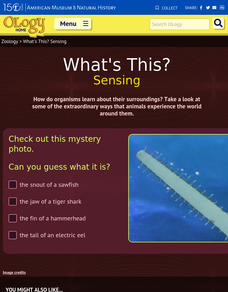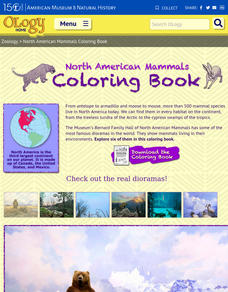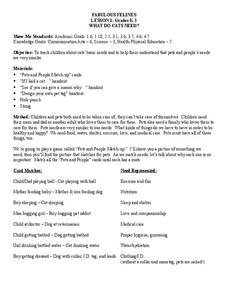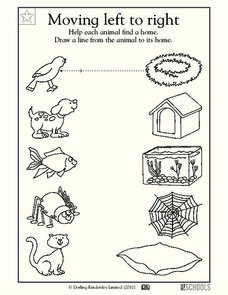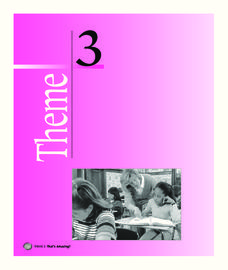Kids Can Have Fun
Old Macdonald Farm Scene
Kids get to practice cutting and pasting with this packet featuring Old MacDonald, his farm, animals, and farm equipment.
Lerner Publishing
Teaching Habitats
What makes up a habitat? Use this resource to engage first graders in the exploration of desert, wetland, forest, and ocean habitats. Youngsters classify plants and animals into the four distinct habitats through drawings and cutting and...
EngageNY
Interpreting Residuals from a Line
What does an animal's gestation period have to do with its longevity? Use residuals to determine the prediction errors based upon a least-square regression line. This second lesson on residuals shows how to use residuals to create a...
Rainforest Alliance
Growing a Rainforest in Our Classroom
Give your classroom decor a boost with a rainforest themed mural highlighting what class members learned through their five senses—taste, touch, see, smell, and hear. Scholars create a rainforest filled with trees and animals using their...
Curriculum Corner
Hibernation
What is hibernation? Which animals hibernate and which don't? A 40-page packet on hibernation includes graphic organizers, reading passages and pictures about animals that hibernate, task cards, templates for a hibernation booklet,...
American Museum of Natural History
What's This? Sensing
There is a scallop that relies on sight so much that it actually has more than 100 eyes! There are many species that rely heavily on one sense or another. An online interactive resource has youth read about several of these animals. The...
American Museum of Natural History
What's This? Reproduction
Attracting the right mate is as important for humans as any other species. An interesting lesson teaches individuals about several strategies that animals and plants have adapted to attract their mates. From colorful nests to powerful...
American Museum of Natural History
North American Mammals Coloring Book
Seven pages offer scholars the opportunity to learn about North American mammals and boost their coloring skills. Animals include brown bears, beavers, jackrabbits, wolves, jaguar, and Dall sheep
Smithsonian Institution
Trait Tracker
Help mice beat the odds with an exciting activity about traits. Biologists discover the role of diet and other factors on animal traits by participating in a simulation activity. Teams collect and evaluate data to understand how certain...
Curated OER
Life Systems- Zoo Central
Students investigate the various aspects associated with living things while also concentrating on their basic needs. They explore the aspects of movement and growth in plants and animals. This is done through research and other...
Curated OER
Polar Bears
What do you know about polar bears? Get your youngsters writing about these majestic animals with this short writing activity. They simply use the six words provided to create a short story about the picture provided. Review the words...
Curated OER
Fabulous Felines
Students explore basic needs through discovering that pets and people need very similar things. They will play matching games, sing songs, read books, and discuss the needs of people and animals.
Curated OER
The Old White Sheet Trick
Young scholars attract night animals. In this Science instructional activity, students use a large white surface and a light at night. Young scholars observe and record what they see.
Curated OER
Who Wants to be a Millionaire: Teeth
What kind of teeth do alligators have? Find out as you play a quiz game all about teeth. There are 15 questions all related to how various animals eat, swallow, and chew with their chompers.
Curated OER
Moving Left to Right
These animals need to find their homes! Young scholars help them by drawing lines from each animal on the left to its habitat on the right. There is no guessing to be done here, though; pairs are directly across from one another. They...
Curated OER
Animal Flashcards
Print, cut, and color these flashcards! Your young learners will love learning the Spanish words for their favorite animals! There are 24 flashcards included.
August House
Why Koala Has a Stumpy Tail
Learn about the animals of Australia with a language arts instructional activity about an Australian folktale called, Why Koala Has a Stumpy Tail. After reading the story as a class, kids discuss events and characters from the book,...
National Wildlife Federation
Massive Migrations
Turn your young scholars into flocks of migratory birds for this fun instructional activity on animal migration. Prior to the activity, the teacher creates four different migration routes in the classroom or any available open space,...
Twisty Noodle
Las Mascotas (Pets) Book
What animal is that, and can you say it in Spanish? Teach your class eight different animals by asking pupils to put together this cute book that includes images and simple Spanish sentences.
Teaching Mama
P is for Penguins
Practice printing, matching, tracing, cutting, coloring, and more with a packet full of penguins! Allow these perky winter animals to help your kids out as they work on these skills.
ARKive
An Introduction to Endangered Species
Explore the world's endangered species with a presentation and bingo game activity. After viewing a presentation about the meaning of endangered species as it relates to specific animals, kids play a game of bingo with cards that...
Michigan State University
Create an Animal
Think beyond the animals and habitats we've already discovered and allow scholars to dream up their very own habitat and an animal that lives there. Class members present the new habitat and animal on a poster alongside an...
Houghton Mifflin Harcourt
Off to Adventure!: English Language Development Lessons (Theme 1)
Give language skills a boost with a series of ESL lessons in an Off to Adventure! themed unit. Using a speak, listen, move, and look routine, scholars enhance proficiency through grand conversation and skills practice. Discussion topics...
Houghton Mifflin Harcourt
That’s Amazing!: English Language Development Lessons (Theme 3)
That's Amazing! is the theme of an English language development unit created by Houghton Mifflin. Following a speak, look, move, and listen routine, scholars delve into topics; seasons, weather, animals, landforms, telling time,...
Other popular searches
- Farm Animals
- Zoo Animals
- Nocturnal Animals
- Prehistoric Animals
- Arctic Animals
- Jungle Animals
- Plants and Animals
- Desert Animals
- Animals and Their Habitats
- Oviparous Animals
- Classification of Animals
- Winter Animals







